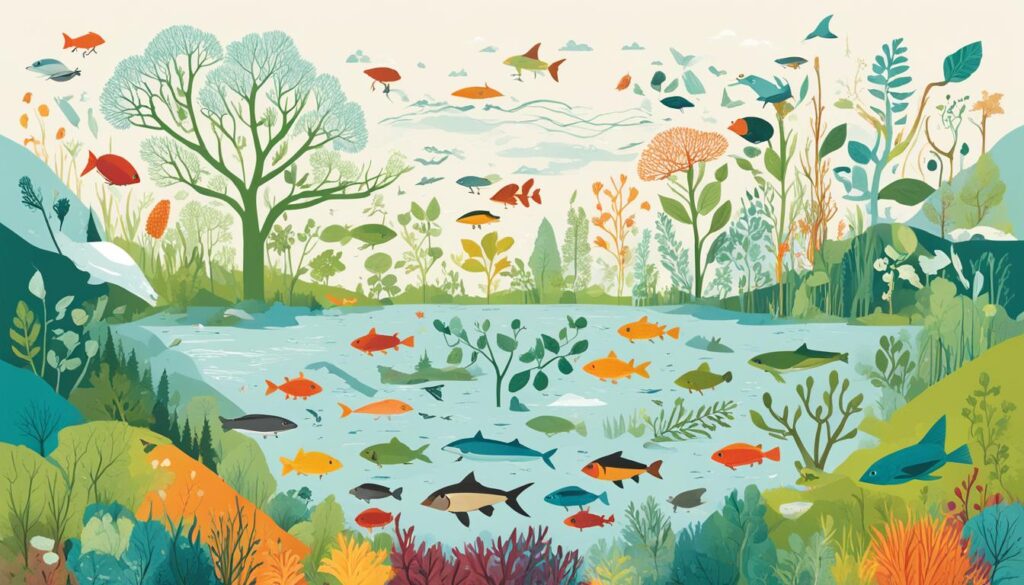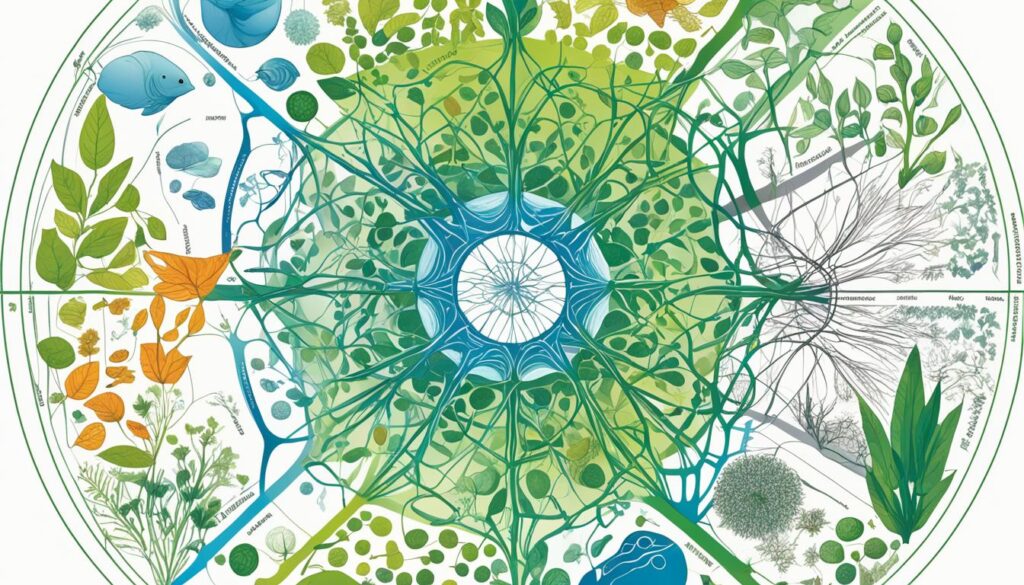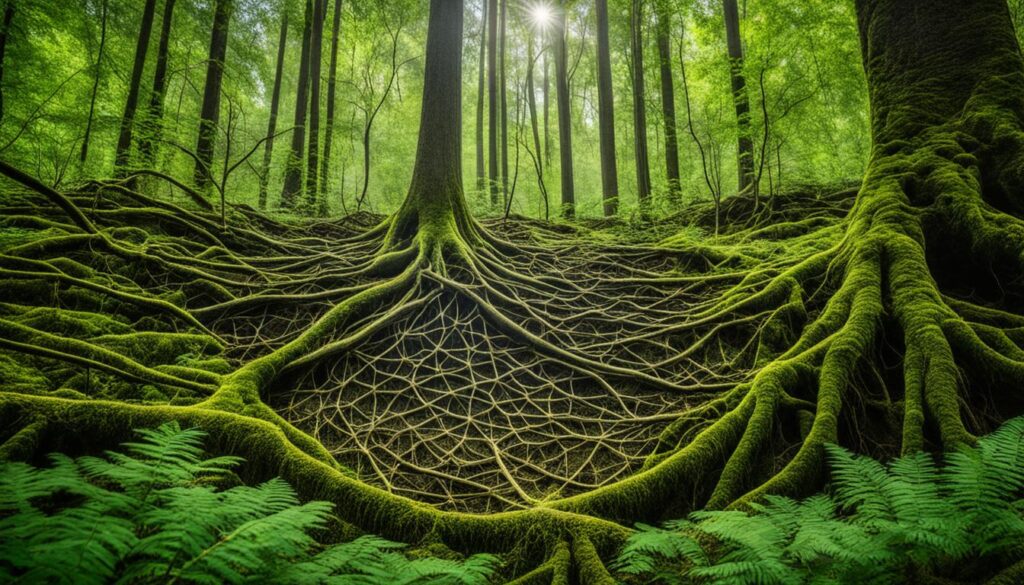Ecology is the study of how living things interact with their surroundings. It looks at the complex relationships and dependencies in our natural world. From tiny microbes to big ecosystems, ecology helps us see how everything is connected. By understanding these connections, we can live more sustainably and protect our natural world.

Create an image showcasing the diverse and interconnected systems present in nature, with a focus on the relationships between different organisms and their surroundings. Incorporate elements such as ecosystems, food webs, natural resources, and the impact of human activity on the environment. Use a color palette that reflects the vibrancy and complexity of the natural world.
Key Takeaways
- Ecology is the study of the relationships between living organisms and their physical environment.
- Ecosystems are made up of a complex web of interdependent relationships that must be understood to enact effective conservation efforts.
- Sustainable living and environmental protection are crucial for preserving the delicate balance of our natural world.
- Addressing issues like climate change, biodiversity loss, and pollution require a holistic, ecological approach.
- Understanding the interconnectedness of ecology can lead to innovative solutions for environmental challenges.
Unraveling the Complexity of Ecosystems
Ecology studies the complex relationships within ecosystems. It looks at how living things, from tiny microbes to big mammals, work together and with their environment. This balance is key to keeping our natural systems healthy.
Defining Ecology and Its Significance
Ecology is the study of how living things and their environment interact. It looks at how these interactions affect species distribution, energy flow, and nutrient cycling. By understanding this, ecologists help us manage and protect our natural resources for the future.
The Intricate Web of Life
At the core of ecology is the idea of an ecosystem. It’s a place where living things and their environment work together. Each species has a role in the food chain and nutrient cycle, making the ecosystem diverse and stable. Losing a species can harm the whole habitat.
| Key Ecological Concepts | Explanation |
|---|---|
| Ecosystem | A community of living organisms interacting with one another and their physical environment |
| Food Chain | The transfer of energy and nutrients from one organism to the next as each consumes the other |
| Nutrient Cycle | The movement of essential nutrients, such as carbon, nitrogen, and water, through the ecosystem |
| Biodiversity | The variety of living species within an ecosystem, which contributes to its overall stability and resilience |
| Habitat | The natural environment in which a species lives and thrives |
“The health of our natural systems is intricately linked to the delicate balance of the ecosystems that sustain them. Understanding and protecting this intricate web of life is crucial for our own well-being and the future of our planet.”
ECOLOGY: A Holistic Approach
Ecology is a deep field that looks at the world in a big way. It focuses on how living things and their environment work together. By studying these connections, ecologists learn about the balance in nature.
This field uses ideas from many areas like biology, chemistry, and geography. It helps us see how everything in nature is connected. This way, we get a full picture of how the environment works.
Ecologists see nature as a system, not just a bunch of parts. They look at how living things like plants and animals affect each other and their homes. This helps us understand how to take care of nature and how our actions might change it.
By looking at nature through environmental science, ecologists can find ways to protect our natural resources. They help us tackle big issues like climate change and saving natural places. Their work is key to making better choices for the future.

Create an image of an intricate web of natural systems, showcasing the complex and interconnected relationships between different elements of ecology. Use colors and patterns to differentiate between different systems, such as water, air, plants, and animals. Incorporate circular and spiral shapes to convey a sense of cyclical processes and interdependence. Avoid linear or compartmentalized designs, instead opting for a more holistic and organic approach.
“Ecology is the study of the relationships between living organisms and their environment.”
| Key Principles of Ecology | Description |
|---|---|
| Systems Thinking | Recognizing that ecosystems are complex, interconnected systems where all components are interdependent. |
| Interdisciplinary Approach | Drawing insights from various scientific disciplines to gain a comprehensive understanding of environmental processes. |
| Sustainability | Promoting the responsible management and conservation of natural resources to ensure their long-term availability. |
| Environmental Science | Applying scientific principles and methods to study the interactions between living organisms and their environment. |
Environmental Conservation: Protecting Our Natural Heritage
Ecology is key in protecting our environment. It looks at how living things interact with their surroundings. Preserving biodiversity is vital for our ecosystems’ health and resilience.
Biodiversity: The Key to Resilient Ecosystems
Biodiversity keeps nature in balance. Ecologists work hard to save habitats from threats like habitat loss and climate change. They aim to protect the variety of life on our planet.
By saving biodiversity, we make our ecosystems stronger. They can better handle environmental challenges. This keeps the services they provide, like clean water and food, safe for us.
| Key Aspects of Environmental Conservation | Importance |
|---|---|
| Habitat Protection | Preserving the natural homes of diverse species, ensuring their survival and the maintenance of healthy ecosystems. |
| Endangered Species Conservation | Protecting and restoring populations of threatened and endangered plants and animals, preventing extinctions. |
| Ecosystem Resilience | Maintaining the ability of ecosystems to withstand and recover from disturbances, ensuring their long-term sustainability. |
By taking a comprehensive approach to conservation, we can protect our natural world. This ensures a healthy, resilient planet for the future.

An image of a pristine forest with an intricate web of interconnected roots and branches, showcasing the delicate balance of nature’s interconnected systems. The focus should be on the beauty and complexity of the ecosystem, highlighting the need to protect it for future generations.
“The greatest threat to our planet is the belief that someone else will save it.”
– Robert Swan, Author and Environmentalist
Sustainable Living: Harmonizing with Nature
Ecology is key to living sustainably. It means we work with nature, not against it. We use green technologies, renewable energy sources, and resource conservation practices to lessen our ecological footprint. This way, we can live in a way that keeps our planet healthy and full of life.
Starting sustainable living means understanding how everything in nature is connected. Sustainable development aims to meet the needs of people, the planet, and future prosperity. It’s about making choices now that won’t harm the future. By being innovative and respecting nature, we can build communities that live well with their environment.
Living sustainably means using renewable energy and saving resources. It’s about making choices that protect our planet. By following these principles, we can make a future where progress and nature go together. This creates a stronger, more sustainable world for everyone.
Important Points
NO. | Important Points |
1. | |
2. | |
3. | |
4. |
FAQ of Ecology
What is ecology and why is it important?
Ecology studies how living things interact with their environment. It looks at things like climate, water, and soil. This field is key because it helps us understand how everything in nature is connected. This knowledge helps us live in a way that’s good for the planet.
How do ecosystems work?
Ecosystems are complex networks of life. They have everything from tiny microbes to big animals, all working together. They keep a balance by sharing energy and nutrients. Knowing how they work helps us take care of nature.
What is the holistic approach of ecology?
Ecology looks at the big picture, seeing everything as connected. By studying how different parts of an ecosystem interact, we learn a lot. This helps us make better plans for taking care of nature. It uses many different fields of study to get a full view of the world.
How does environmental conservation relate to ecology
Environmental conservation is a big part of ecology. It’s about keeping nature safe. Keeping different kinds of life in an ecosystem is key to keeping it healthy. Scientists work to save important places and fight threats like habitat loss and climate change.
What is the role of ecology in sustainable living?
Ecology helps us live in a way that’s good for the planet. It means using green tech, renewable energy, and saving resources. By living like this, we can help keep our planet healthy and full of life for the future.
See these too
- Read Also: Discover the Wonders of Geology: Earth’s Story Unveiled
- Read Also: Understanding Growth in Astronomy & Finance
- Read Also: Understanding Absolute Magnitude in Astronomy
- Read Also: Discover the Wonders of Ecology: Nature’s Balance
- Read Also: Absorption

Hello
I wanted to see if you would be open to rejuvenating online presence with our all-in-one website service.
Here is our offer
1. We rebuild your website
2. We maintain your website monthly with maintenance and provide you one hour every month of page updates to keep your website up to date for your business, all included.
Get This Entire Package for only $49.99 a month! For real..
And the best part is there is no setup fee!
We are doing this because we do not believe its fair for businesses to pay so much for a great website.
But this offer is only good for few more days, for the first 5 clients, so you need to secure your spot before this offer disappears.
Click Here to Get Started
https://simplybuiltdigital.com/websiteblowout
To Your Undisputed Success